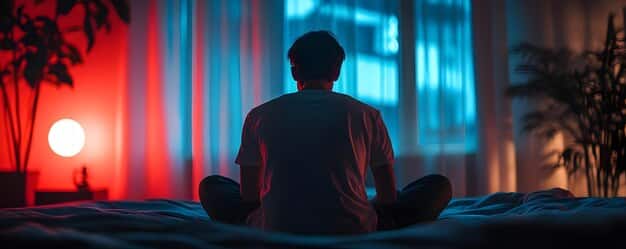Boost Your Winter Sleep: 3 Science-Backed Strategies

Three Science-backed sleep strategies, including optimizing your sleep environment, regulating light exposure, and incorporating mindfulness techniques, can significantly improve your sleep quality by 30% this winter.
As the days shorten and the nights grow colder, many of us find our sleep quality declining. But don’t resign yourself to restless nights! Discover three science-backed sleep strategies to improve your sleep quality by 30% this winter, transforming your nights and revitalizing your days.
Create Your Sleep Sanctuary: Optimizing Your Bedroom Environment
Your bedroom should be a haven for relaxation and sleep. Optimizing the environment is crucial for signaling to your body that it’s time to rest. Simple changes can make a big difference to your sleep quality.
Creating a sleep sanctuary involves addressing factors that can disrupt your sleep. Think about temperature, noise, and light.
Temperature Control for Optimal Sleep
A cool room is generally better for sleep. Experts recommend a temperature between 60 and 67 degrees Fahrenheit (15.5 to 19.4 degrees Celsius). Lowering your body temperature is a natural part of the sleep process, and a cool room can facilitate this.
Noise Reduction for Uninterrupted Sleep
Minimize noise disturbances. Use earplugs, a white noise machine, or a fan to block out unwanted sounds. Even small noises can disrupt sleep cycles.
- Invest in blackout curtains to block out external light sources.
- Ensure your mattress and pillows are comfortable and supportive.
- Consider using aromatherapy with calming scents like lavender.
By making these adjustments, you create a bedroom environment that promotes relaxation and improves sleep quality. A well-optimized sleep sanctuary can significantly reduce sleep latency, the time it takes to fall asleep, and increase overall sleep duration.
Maximize Morning Light, Minimize Evening Blue Light for Better Sleep
Light exposure plays a critical role in regulating your body’s natural sleep-wake cycle, also known as the circadian rhythm. Understanding how light impacts your sleep and making intentional adjustments can lead to significant improvements.
This strategy focuses on syncing your internal clock with the daily light-dark cycle. It’s a powerful way to combat winter sleep disruptions.

The Importance of Morning Sunlight
Expose yourself to bright light, preferably sunlight, early in the morning. This helps to suppress melatonin production and signals to your body that it’s time to be awake and alert. Even on cloudy days, natural light is more beneficial than artificial light.
The Dangers of Evening Blue Light
In the evening, minimize your exposure to blue light emitted by screens (smartphones, tablets, computers, TVs). Blue light can disrupt melatonin production and make it harder to fall asleep. Use blue light filters on your devices, install blue light blocking apps, or wear blue light blocking glasses.
- Aim for at least 30 minutes of sunlight exposure each morning.
- Avoid screen use for at least an hour before bedtime.
- Consider using red or amber-tinted night lights, which have a less disruptive effect on sleep.
Regulating light exposure is a straightforward yet highly effective strategy for improving sleep, especially during the winter months when natural light is limited. By maximizing morning light and minimizing evening blue light, you can reinforce your body’s natural sleep-wake cycle.
Mindfulness for Sleep: Calming Your Mind Before Bed
A racing mind is a common obstacle to restful sleep. Practicing mindfulness techniques can help quiet the mind and prepare your body for sleep. These techniques focus on bringing awareness to the present moment, reducing stress, and promoting relaxation.
Mindfulness isn’t about emptying your mind; it’s about observing your thoughts and feelings without judgment.
Deep Breathing Exercises for Relaxation
Practice deep breathing exercises before bed. Inhale deeply through your nose, hold for a few seconds, and exhale slowly through your mouth. Repeat this several times to calm your nervous system and reduce anxiety.
Meditation for a Peaceful Mind
Engage in meditation. There are many guided meditation apps and videos available that can walk you through relaxation techniques. Begin with just a few minutes each night and gradually increase the duration as you become more comfortable.

Body Scan Meditation for Tension Release
Try a body scan meditation. This involves focusing your attention on different parts of your body, noticing any sensations without judgment, and releasing tension. This can help you become more aware of physical discomfort and promote relaxation.
- Start with a short 5-minute meditation and gradually increase the duration.
- Create a consistent pre-sleep routine that includes mindfulness practice.
- Use mindfulness techniques not just before bed, but also throughout the day to manage stress.
Incorporating mindfulness into your nightly routine can significantly improve your sleep quality. By calming your mind and reducing stress, you allow your body to transition more easily into a state of rest and promote deeper, more restorative sleep.
Consistency is Key: Maintaining a Regular Sleep Schedule
The human body thrives on routine, and sleep is no exception. Maintaining a consistent sleep schedule is one of the most impactful strategies for improving sleep quality. This means going to bed and waking up at the same time every day, even on weekends.
A regular sleep schedule helps regulate your body’s internal clock, making it easier to fall asleep and wake up feeling refreshed.
The Benefits of a Fixed Sleep-Wake Time
Setting a fixed sleep-wake time helps synchronize your circadian rhythm, the body’s natural 24-hour cycle, which governs sleep, hormone release, and other vital functions. When your circadian rhythm is aligned, you’ll find it easier to fall asleep at night and wake up in the morning without feeling groggy.
Weekend Sleep: Avoid Oversleeping
However tempting it may be, avoid oversleeping significantly on weekends. Sleeping in too late can disrupt your circadian rhythm and make it harder to fall asleep on Sunday night, leading to a poor start to the workweek. Try to keep your weekend sleep schedule within an hour of your weekday schedule.
Creating a Bedtime Routine
Establish a relaxing bedtime routine can signal to your body that it’s time to wind down. This could include taking a warm bath, reading a book, listening to calming music, or practicing relaxation techniques. Consistency is key, so try to follow the same routine every night.
- Set an alarm for both bedtime and wake-up time and stick to it as closely as possible.
- Avoid napping during the day, especially in the late afternoon, if it interferes with your nighttime sleep.
- Expose yourself to natural light first thing in the morning to reinforce your body’s sleep-wake cycle.
Diet and Hydration: Fueling Better Sleep
What you eat and drink can significantly impact your sleep quality. Certain foods and beverages can promote relaxation and sleep, while others can disrupt your sleep patterns. Being mindful of your diet and hydration habits can contribute to a more restful night.
This section explores how to make smart food and drink choices to support better sleep.
Foods and Drinks to Encourage Sleep
Some foods contain nutrients that promote relaxation and sleep. For example, foods rich in tryptophan, such as turkey, nuts, and seeds, can help your body produce melatonin, the sleep hormone. Magnesium-rich foods, such as leafy greens and dark chocolate, can also promote relaxation. Additionally, drinking herbal teas like chamomile or valerian root tea before bed can have a calming effect.
Foods and Drinks to Avoid Before Bed
Certain foods and beverages can interfere with sleep. Avoid caffeine and alcohol close to bedtime. Caffeine is a stimulant that can keep you awake, while alcohol, although it may initially make you feel drowsy, can disrupt your sleep later in the night. Also, avoid heavy, fatty, or spicy meals before bed, as they can cause indigestion and discomfort.
Hydration Habits for Better Sleep
Stay hydrated throughout the day, but avoid drinking too much fluid close to bedtime to reduce the need to wake up to urinate. Dehydration can also disrupt sleep, so aim for a balanced fluid intake throughout the day.
- Include foods like kiwi, cherries, and milk in your diet, which have been shown to promote sleep.
- Be mindful of portion sizes, especially at dinner, to avoid feeling overly full or uncomfortable before bed.
- Maintain a consistent meal schedule to help regulate your body’s hunger and fullness cues.
By paying attention to your diet and hydration habits, you can create a more conducive environment for sleep. Making small, mindful changes can lead to significant improvements in the quality and duration of your sleep.
Exercise Smart: Timing Your Workouts Right
Regular physical activity is beneficial for overall health and can also improve sleep quality. However, the timing of your workouts is crucial. Exercising too close to bedtime can have a stimulating effect, making it harder to fall asleep.
This section explores how to exercise strategically to support better sleep.
The Benefits of Regular Exercise
Engaging in regular physical activity can reduce stress, improve mood, and promote better sleep. Exercise can also help regulate your circadian rhythm, making it easier to fall asleep and wake up at a consistent time.
Avoid Intense Workouts Before Bed
Avoid intense workouts in the hours leading up to bedtime. Strenuous exercise can increase your heart rate and body temperature, making it difficult to relax and fall asleep. If you prefer to exercise in the evening, opt for lighter activities like yoga or stretching.
Optimal Timing for Exercise
The best time to exercise for sleep benefits is in the morning or early afternoon. This allows your body temperature and heart rate to return to normal before bedtime. Aim for at least 30 minutes of moderate-intensity exercise most days of the week.
- If you must exercise in the evening, try to finish your workout at least three hours before bedtime.
- Incorporate relaxation techniques, such as stretching or meditation, into your post-workout routine to help your body wind down.
- Be consistent with your exercise schedule to help regulate your body’s natural sleep-wake cycle.
By timing your workouts strategically, you can harness the sleep-enhancing benefits of exercise without disrupting your nighttime rest. Finding the right balance can lead to significant improvements in both the quality and duration of your sleep.
| Key Points 💡 | Brief Description |
|---|---|
| 🛏️ Optimize Bedroom | Control temperature, reduce noise, and block out light for optimal sleep. |
| ☀️ Light Exposure | Maximize morning sunlight; minimize evening blue light from screens. |
| 🧘 Mindfulness | Practice mindfulness, meditation, or deep breathing before bed. |
| ⏰ Consistent Schedule | Maintain a regular sleep schedule, even on weekends, for better sleep. |
Frequently Asked Questions (FAQ)
Ensure your bedroom is dark, quiet, and cool. Use blackout curtains, earplugs, or a white noise machine. Keep the temperature between 60-67°F (15.5-19.4°C) for optimal sleep.
Blue light emitted from screens can suppress melatonin production, a hormone essential for sleep. This disruption makes it harder to fall asleep and can reduce sleep quality.
Practice deep breathing exercises, meditation, or body scan meditation before bed. These techniques calm your mind and reduce stress, promoting relaxation and better sleep.
Maintaining a consistent sleep schedule is crucial for regulating your body’s internal clock (circadian rhythm). It helps you fall asleep and wake up easier, leading to improved sleep quality.
Avoid caffeine, alcohol, heavy, fatty, or spicy meals close to bedtime. These can disrupt your sleep patterns by stimulating your system or causing digestive discomfort.
Conclusion
Improving your sleep quality during the winter months can be achieved by implementing these science-backed strategies. By optimizing your sleep environment, regulating light exposure, incorporating mindfulness techniques, maintaining a regular sleep schedule, and being mindful of your diet and exercise habits, you can significantly enhance your sleep and wake up feeling refreshed and revitalized. Embrace these changes to transform your winter nights and improve your overall well-being.





